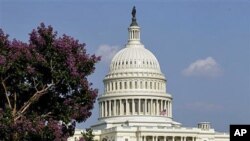The U.S. Senate has blocked a Democratic proposal to raise the federal borrowing limit and avoid a potential default on America’s $14.3 trillion national debt. With both Republican and Democratic plans now defeated, focus shifts to last-ditch negotiations between congressional leaders and the White House. Lawmakers are expressing cautious optimism that a bipartisan deal may soon be at hand.
Appearing on U.S. television, the Senate’s top Republican, Minority Leader Mitch McConnell, said he and the White House are “very close” to an agreement that could attract bipartisan congressional support.
The news was welcomed by Democratic Senator Richard Durbin of Illinois. “I have a much more positive feeling than I did 24 hours ago,” said Durbin. Durbin spoke on the Fox News Sunday television program.
After months of partisan gridlock, the agreement being hammered out reportedly calls for trillions of dollars in spending cuts in two stages, and includes a legislative enforcement mechanism to ensure the cuts materialize. Those elements would satisfy several long-standing Republican demands.
After an initial round of cuts, a bipartisan congressional committee would identify further spending reductions and, it is hoped, prevent a repeat of the legislative gridlock that has consumed Washington for months. The agreement would reportedly assure the U.S. government’s solvency through the end of next year - a key Democratic demand.
“We are not returning to this before Christmas. We are going to do this in a way so that the economy is not in suspense and doubt about our future,” said Durbin.
Also appearing on Fox News Sunday was Republican Senator Jon Kyl of Arizona, who also expressed satisfaction with an end result that forces the U.S. government to rein in spending.
“Three months ago, the president [[Barack Obama]] insisted on a ‘clean’ debt ceiling extension [[greater borrowing authority without conditions]]," ,” said Kyl. Clearly, we will have a significant amount of spending reductions in this proposal.”
But can this reported agreement, if finalized, or any agreement pass both houses of a politically-divided and polarized Congress? Senator Durbin.
“I do not know the answer to that,” said Durbin.
The House of Representatives may pose the greatest challenge to raising the debt ceiling. Last week, the Republican-controlled House defeated a first-draft debt proposal put forth by Speaker John Boehner. If Republicans are willing to rebel against bills written by their own speaker, a bipartisan accord could prove even more challenging to pass. The House Republican charged with lining up party votes, Majority Whip Kevin McCarthy, is non-committal.
“We will first have to look at the details. But [negotiations are] moving in the right direction,” said McCarthy.
Even if an accord is finalized, passed, and signed into law by President Barack Obama, it remains to be seen whether the U.S. government will retain its top-tier credit rating. A downgrade could lead to higher interest rates, pummeling a weak U.S. economy and making debt servicing even more expensive.




